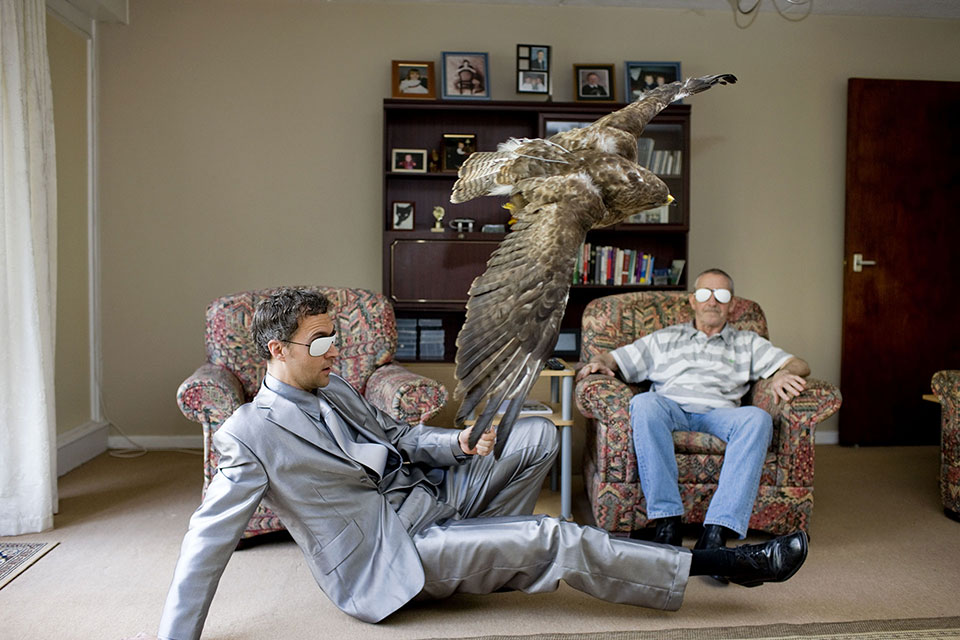As the Heygate begins to tumble, Tom Jeffreys returns to Elephant and Castle for Marcus Coates’ new film, Vision Quest.
Three years ago I attended what is still one of the strangest events of my life. Despite having spoken to Michael Smythe, the project’s producer, and Marcus Coates, the artist responsible, the week before, the event managed to be simultaneously surprising, challenging, awkward and utterly baffling. You might say that the event – entitled A Ritual for Elephant and Castle – was simply a load of old nonsense, but perhaps it would be more accurate to describe it as strategically resistant to a singular, rational interpretation. Consisting of a viscerally shamanic performance by Coates (clad in a shiny silver suit and sporting a real horse’s head atop his own) supplemented by the perennially unsettling experimental funk-noise of Chrome Hoof, it was also a hell of a lot of fun.
Now, just under three years later, Coates has unveiled a full-length film that documents both the original performance and the processes that informed it. And in a sense it couldn’t be better-timed. Entitled Vision Quest, the film explores the redevelopment of the notorious Heygate Estate, which has been on the agenda of Southwark Council for some years. Demolition of the vast estate is finally under way, and with the screening taking place inside the bright pink Elephant and Castle shopping centre (itself scheduled for redevelopment) there’s a sense that Vision Quest marks the end (and beginning) of an era.
But there’s also a broader sense in which the film is timely. As the Shard scratches at the sky and the Olympics are constructed through a corporatised process of exclusion; as counter-cultural interventionists like the Occupy movement and Trenton Oldfield highlight an increasing lack of genuine public space (physically, politically, intellectually…); and as Ken and Boris resort to fisticuffs in a lift, London’s citizens are being forced to think increasingly deeply about the kind of city they want to live in, and about how that vision (or series of visions) might actually be realised.
All of this is explored, brilliantly and with no little humour, in Vision Quest. First shown in public as a twelve-screen installation, this newly edited version fuses together the conflicting experiences, lives, hopes, agendas, worries and desires of a host of those related to the development. We meet local council employees (white shirts, sleeves rolled up), a local youth with a brutal-looking dog, long-time residents of the Heygate (notably Ernie, who’s lived on the estate for 25 years), the project’s original architect, Tim Tinker (who blames Thatcher’s Right to Buy policy for the Heygate’s premature destruction) and the memorable Waheed Chaker, a development consultant who comes across as a mix between Native American mystic and pony-tailed PPP yuppie, with all his strange talk of “neo-London”.
As the title suggests, Vision Quest revolves around the relationship between the twin ideas of vision (corporate, social, architectural, mystical etc) and journey – as something that both informs the development of a vision and frustrates its pure realisation as packaged product. The journey here is intensely specific to Coates, the Heygate and Elephant and Castle – one full of anger, regret, suspicion, friendship and humour – but also one that reaches out to broader points about politics, architecture and society in general. We witness how the rich promise of the Heygate as a “cheerful, well-designed new home” designed for “happy healthy lives” slowly deteriorated and collapsed. “Welcome to Utopia”, graffiti-scrawled across a concrete wall, neatly encapsulates the complex failures of the Modernist programme.
Across all of these disparate elements moves Coates himself, in cheaply shining silver suit. He strolls through the area’s dark backstreets, chats to local residents, traders, passers-by. He dangles what looks like a stuffed Peregrine Falcon over a group of late-night domino players; he hangs precariously from a ledge, with horse’s head lying on the ground below; he presses his face into the pavement, blubbering and salivating onto the asphalt; in a moment of sheer genius, he even makes bird calls in response to the intermittent squeals of lumbering excavators (one is even emblazoned with the ornithologically tinged name Balicrest).
“I need to know the place without using thought,” Coates declares at one stage, in a kind of explanation for his strange, ritualistic acts. This enaction of something beyond the humanly rational is what allows Coates’ actions to traverse the self-interest of the architect or the resident or the profit-driven developer. But it is also what prevents it, rightly, from some kind of neat concluding synthesis. Instead we have the bathetic grandeur of A Ritual for Elephant and Castle. That it is ludicrous, futile, impotent is now understood; that it is nonetheless necessary, a revelation.
Vision Quest is at Elephant and Castle shopping centre until 29th April 2012.
Marcus Coates – Proxy is at Kate MacGarry until 14th April 2012.
Image credit: Nick David
